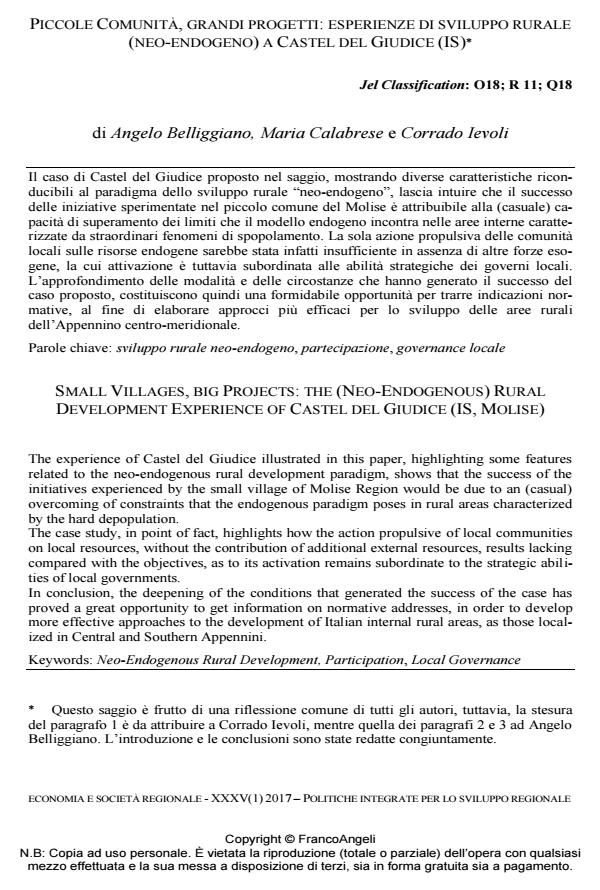Piccole comunità , grandi progetti: esperienze di sviluppo rurale (neo-endogeno) a Castel Del Giudice (Is)
Titolo Rivista ECONOMIA E SOCIETÀ REGIONALE
Autori/Curatori Angelo Belliggiano, Maria Calabrese , Corrado Ievoli
Anno di pubblicazione 2017 Fascicolo 2017/1
Lingua Italiano Numero pagine 16 P. 65-80 Dimensione file 373 KB
DOI 10.3280/ES2017-001006
Il DOI è il codice a barre della proprietà intellettuale: per saperne di più
clicca qui
Qui sotto puoi vedere in anteprima la prima pagina di questo articolo.
Se questo articolo ti interessa, lo puoi acquistare (e scaricare in formato pdf) seguendo le facili indicazioni per acquistare il download credit. Acquista Download Credits per scaricare questo Articolo in formato PDF

FrancoAngeli è membro della Publishers International Linking Association, Inc (PILA), associazione indipendente e non profit per facilitare (attraverso i servizi tecnologici implementati da CrossRef.org) l’accesso degli studiosi ai contenuti digitali nelle pubblicazioni professionali e scientifiche.
Il caso di Castel del Giudice proposto nel saggio, mostrando diverse caratteristiche ricon-ducibili al paradigma dello sviluppo rurale "neo-endogeno", lascia intuire che il successo delle iniziative sperimentate nel piccolo comune del Molise è attribuibile alla (casuale) capacità di superamento dei limiti che il modello endogeno incontra nelle aree interne caratterizzate da straordinari fenomeni di spopolamento. La sola azione propulsiva delle comunità locali sulle risorse endogene sarebbe stata infatti insufficiente in assenza di altre forze esogene, la cui attivazione è tuttavia subordinata alle abilità strategiche dei governi locali. L’approfondimento delle modalità e delle circostanze che hanno generato il successo del caso proposto, costituiscono quindi una formidabile opportunità per trarre indicazioni normative, al fine di elaborare approcci più efficaci per lo sviluppo delle aree rurali dell’Appennino centro-meridionale.
Parole chiave:Sviluppo rurale neo-endogeno, partecipazione, governance locale
- Neo-Endogenous Rural Development in Favor of Organic Farming: Two Case Studies from Italian Fragile Areas Angelo Belliggiano, Alberto Sturla, Marco Vassallo, Laura Viganò, in European Countryside /2020 pp.1
DOI: 10.2478/euco-2020-0001 - Neoendogenous Development in European Rural Areas Marilena Labianca, Stefano De Rubertis, Angelo Belliggiano, Angelo Salento, Francisco Navarro, pp.111 (ISBN:978-3-030-33462-8)
Angelo Belliggiano, Maria Calabrese , Corrado Ievoli, Piccole comunità , grandi progetti: esperienze di sviluppo rurale (neo-endogeno) a Castel Del Giudice (Is) in "ECONOMIA E SOCIETÀ REGIONALE " 1/2017, pp 65-80, DOI: 10.3280/ES2017-001006